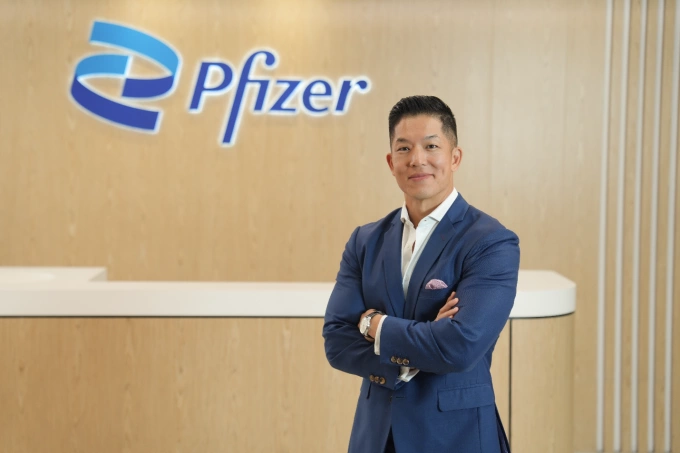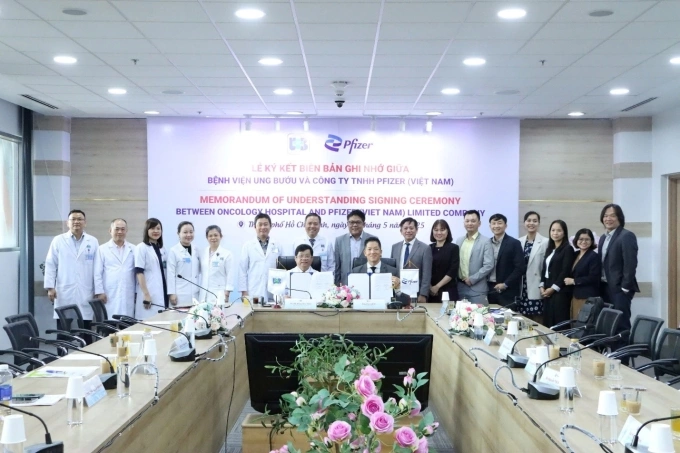Vietnam is going through a transformation as the government is driving science and technology innovation through Resolution 57 by the General Secretary, while the Ministry of Health pushes for healthcare reforms with a focus on primary care and prevention strategies.
Joining this journey, Darrell Oh—General Director of Pfizer Vietnam—shares the new strategic direction and how the company accompanies Vietnam’s healthcare transformation.

Darrel Oh, General Director of Pfizer Vietnam. Photo courtesy of Pfizer Vietnam
Pfizer has had a global reputation for healthcare innovation for years. How do you translate that legacy into your strategy for Vietnam?
Vietnam is entering a new era, where healthcare is not only vital for social welfare but also an economic driver. In line with this, Vietnam has launched the Strategy for the Development of the Pharmaceutical Industry, targeting 2030 with a vision for 2045, and setting an ambitious goal to contribute US$20 billion to the country’s GDP. Achieving this requires accelerating healthcare innovation.
With 175 years of global expertise, capabilities, and R&D platforms, Pfizer is ready to support Vietnam’s goals. Over two decades of operations here, Pfizer has helped bring essential medicines and vaccines closer to patients and has supported the growth of Vietnam’s pharmaceutical industry, contributing to the country’s economic development.
In response to rising disease burdens in Vietnam, such as infectious respiratory diseases, chronic illnesses, and an aging population, the Ministry of Health is prioritizing prevention. How is Pfizer contributing?
Every year, millions are hospitalized due to pneumonia, RSV, influenza, and Covid-19 globally. As a subtropical country, Vietnam regularly faces significant burdens from respiratory diseases.
Addressing these challenges requires prioritizing preventive healthcare. The amended Pharmaceutical Law effective July 1, and the draft Law on Disease Prevention, which will be submitted to the National Assembly in October, both reflect Vietnam’s commitment to strengthening preventive care.
We’re continuously researching and developing a comprehensive “toolbox” of innovative vaccines, breakthrough treatments, and strategic partnerships to expand access.
With a deep heritage in respiratory disease, strong biological expertise, and capabilities for developing vaccines, Pfizer aims to tackle urgent health challenges, especially in respiratory diseases, driving positive impact on the lives of millions of people.
Our key investment areas include:
Innovative preventive solutions: we’re committed to advancing preventive capabilities to reduce burdens of major infectious diseases, including Covid-19, pneumococcal disease (a leading cause of pneumonia, meningitis, and bacteremia), meningococcal disease (causing meningitis and blood infection), and respiratory syncytial virus (RSV).
Antimicrobial Resistance (AMR): We support hospitals and policy groups to promote antimicrobial stewardship, training, and diagnostics because this isn’t just a clinical challenge; it’s a public health emergency.
Accessibility: Pfizer strives to accelerate the availability of potentially life-saving vaccines and treatments. In Vietnam, we are collaborating with relevant partners to expand awareness, access, and equity, especially to the high-risk groups such as older adults and those with chronic diseases or weakened immune systems. During the Covid-19 pandemic, Pfizer joined hands with global and local stakeholders, contributing to national immunization efforts.

Pfizer Vietnam partnered with Vietnam Association of Preventive Medicine to organize scientific symposia “The Role of Higher – Valency Pneumococcal Conjugate Vaccines in Adults – Legacy and the Journey Ahead” in 2025. Photo courtesy of Pfizer Vietnam
In terms of access, how does Pfizer improve healthcare for Vietnamese patients?
We are advancing in 6 key areas:
Expanding access to vaccines and treatments: We’re bringing new therapies to Vietnam, particularly in respiratory, oncology, internal medicine, and anti-infective fields.
Policy counselling: As part of PharmaGroup, we support policy advocacy to accelerate authorization processes. We appreciate the Ministry of Health’s adoption of a regulatory reliance pathway in the amended Pharmaceutical Law, which can help bring innovative medicines and vaccines to patients more quickly.
Patient Access Programs: We are also investing in these programs to help patients overcome financial barriers and access innovative treatments equally.
Public-Private Collaboration: Pfizer has established long-standing partnerships with a number of leading hospitals and medical associations (Cho Ray, Bạch Mai, University Medical Center, VNVC…) to support enhancing HCPs capabilities and improving healthcare initiatives, thereby ensuring that innovative treatments are effectively integrated into clinical practice and reach the patients who need them the most.
Equipping the public with knowledge: We expand our healthcare approach through a wide range of disease awareness programs. Our goals are to help patients understand their risks and treatment options so they can proactively engage with healthcare professionals and gain early access to appropriate treatment and prevention.
Talent Development: This is Pfizer’s long-term commitment to healthcare sustainability. Recognized as the Best Place to Work for many years, we build a culture that values purpose, inclusion, and growth, directly contributing to the national strategy on high-quality human capital development.
In this era of national ascendancy, what opportunities and challenges does Pfizer Vietnam see? What actions will the company take to help elevate the country’s healthcare system?
In the new era of national ascendancy, one of the opportunities for Vietnam to achieve a breakthrough lies in its pharmaceutical development strategy, which aims to become a pharmaceutical hub of ASEAN. With a regional market of nearly 700 million people in ASEAN, Vietnam’s potential to serve not just as a central supplier of pharmaceuticals but as a hub of R&D fuelling innovation leading to substantial economic benefits that aligns with the country’s long-term goal of becoming a high-income nation by 2045, based on science, technology, and innovation.

Pfizer Vietnam and Oncology Hospital’s representatives at the signing ceremony. Photo courtesy of Pfizer Vietnam
However, Vietnam is currently in its “golden population” period, which will only last for the next decade. It is important to invest now in healthcare infrastructure, innovation, and access so that the country can leverage this demographic advantage to build a sustainable healthcare system for the future.
The pharmaceutical industry, as one of the most R&D-intensive sectors, is crucial to this transformation.
Pfizer, as a pioneer in global pharmaceutical innovation, is supporting this vision through policy dialogue, strategic forums, and collaborations with the Ministry of Health and other partners to elevate Vietnam’s healthcare standards to global levels.
For us, these initiatives are more than healthcare investments, they are contributions to building a thriving future for Vietnam.
This article is provided by Pfizer Vietnam, edited by VnExpress. The medical information in the article is for reference only and is not a substitute for medical advice, diagnosis, or treatment from a healthcare professional. When necessary, readers must go to a medical facility to receive advice, examination, and treatment regimens appropriate to each specific medical condition.

